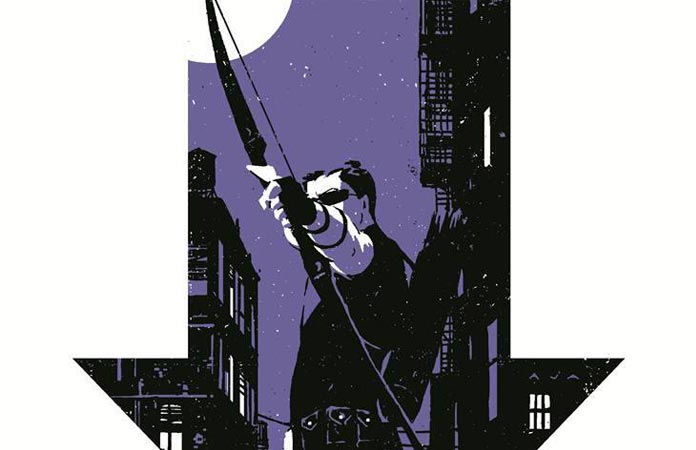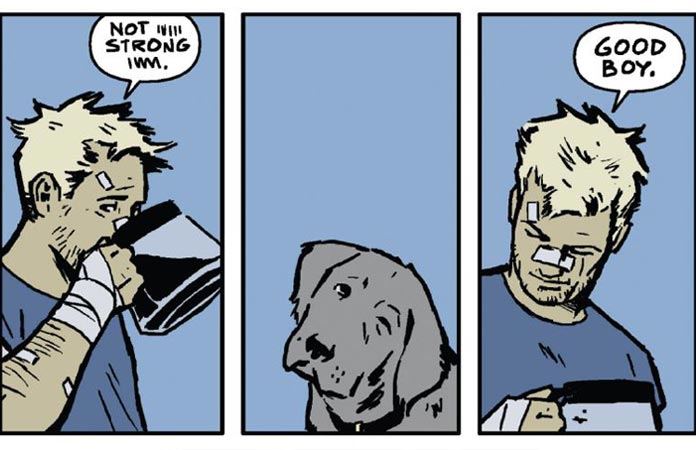The Trouble With Hawkeye
Published on May 6th, 2016 in: Action Movies, Comics, Movies, Over the Gadfly's Nest |By Christine Makepeace

It’s looming on the horizon. Civil War is hanging in the distance–hovering and swollen with promise. But potential disenchantment floats beside it like flotsam skimming the waves. The last time Marvel assembled its mightiest, it wasn’t so, well, mighty.
Age of Ultron failed to reach great heights. It felt clunky and hammered together. Multiple scenes traded in harrowing battles for contemplative conversation. And while I’m never opposed to some character development, I’m also not interested in ham-handed strife, musings on Prima Nocta, and oddly placed declarations about a sterilized woman being a monster. In the year since AoU, scores of articles have been written about these issues, and I’m not keen to throw my two cents in.
But I think we need to talk about Hawkeye.
It was thrilling to see the bow-wielding hero show up in Thor. Those who recognized him felt the rush of insider knowledge, and those that didn’t wanted more. He was filled with promise.
The Avengers only served to strengthen that promise and whet our appetites for more of the quippy good-guy. It was clear that Clint Barton, like us, was just human. He and Natasha, two mere mortals, hung tough as the sky split open and rained aliens over NYC. It was classic Whedon everyman. Like Xander and Willow on the hilltop in Sunnydale, Hawkeye was the dude that would give you a hug and stop the world from ending.
Age of Ultron felt like a bridge. Here, the pieces were assembled for the Infinity Gauntlet; the stage was set for war between leaders. In a movie so thoroughly comprised of connective tissue, every step counted. Each word spoken and choice made had the potential to resonate through every film that follows.
Apparently the choice for Hawkeye was family man. And we were shown this by unending farm sequences. The farm, arguably, was a necessity. It was a safe place that Ultron, having scoured Stark’s files, couldn’t know about. Because SHIELD didn’t know about it. No one knew about it. And that’s sort of the problem. We didn’t know because we weren’t supposed to, and then once we did, it was a head-scratcher—an “I guess so,” sort of moment. It happened because that’s what the movie needed. But did it feel true to the character?

To keep the Marvel Cinematic Universe separate from happenings in the comics is as impossible as it is necessary. Story arcs shift to accommodate the films. Characters are split off into solo titles or treated to revamps that put them on readers’ radars. Whether the MCU is “true” to characters and story lines is almost moot at this stage. The MCU is just that—it’s own universe. The books and movies now exist because of each other, but they are inherently incompatible. So to say I wish MCU Hawkeye was more like Matt Fraction’s run on Hawkeye is almost silly. But the two disparate and unconnected versions highlight what’s so compelling about everyman superhero Hawkeye, and why AoU got it so wrong.
What is so unsatisfying about AoU‘s flannel-wearing dad? It could certainly be that Barton’s secret family felt a little too secret. There’s also a sense that this group of characters—two kids and a pregnant wife—are omnipresent but serve no real role other than concern. The worry of a character that I’ve no connection to elicits nothing in me (even if I enjoy Linda Cardellini).
In Fraction’s Hawkeye series, Kate Bishop says of loner Brooklynite Clint Barton, “He’s… like, a human car-crash. And I just have to watch it happen again and again. It’s depressing.” Hawkeye is deeply flawed and appears out of his depth through many of his solo-series exploits. Who is he to run around with this super-group? He can barely get his life together. There’s something comforting in that, though. The thought that this mess, this human car-crash, can get it together enough to hang with a God and an assassin. It’s Xander all over again, holding his own with a witch and a vengeance demon.
AoU gave us more of the mysterious bowman that hinted at exploits in Budapest. There was room for him to stretch out and breathe. So they put him on a farm. Whedon and team aimed to humanize an already intensely human character, and in order to flesh him out, made him the patriarch of a picture-perfect family. I would’ve preferred a car crash.
Time limit is exhausted. Please reload the CAPTCHA.